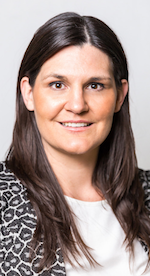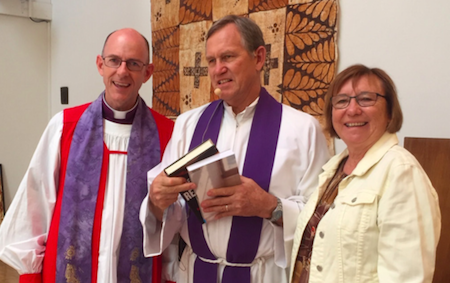Listen to the people, say Marli Banks and Brian Jeffries
17 March 2020
 This is the first instalment of a series where we asked people from around Alice Springs to tell us what they want and expect from whomever is in government come late August.
This is the first instalment of a series where we asked people from around Alice Springs to tell us what they want and expect from whomever is in government come late August.
Today we are publishing excerpts from chats we had with councillor and business person, Marli Banks, and the recently retired Anglican Rector, Reverend Brian Jeffries. Both touched on a similar theme: community engagement by the Northern Territory government to help solve localised issues.
 Marli Banks
Marli Banks
Business owner and councillor, Alice Springs
I hope that whoever should be in power in Darwin after the election can see past the capital and out into regional areas. For any government to succeed they must first engage with the “everyday Joe” to capture community sentiment.
This type of engagement will result in regional and remote areas to have those same economic opportunities that are enjoyed by people in more built-up areas such as Darwin.
The future government’s success will rely on the implementation of an already existing local decision making policy put in place by the NT government, which engages local decision making through proper consultation and proper engagement with Aboriginal communities around the territory.
 Reverend Brian Jeffries
Reverend Brian Jeffries
Recently retired Anglican Rector, Alice Springs (pictured centre)
Community engagement can involve the addition of Aboriginal languages to the curriculum in schools across the Territory.
As a former teacher and educator, I believe Indigenous young people being able to express themselves through language and culture could help with confidence, self-esteem and gaining a sense of belonging in the education system and in our community.
Without policy backing up the dedicated working individuals and schools within our education system it can become “ad hoc” and depend on the political leaders of the day.
Rigid prioritisation around NAPLAN and other national standards means that sometimes the teaching of Aboriginal languages and culture get left off the curriculum.
This is an issue that probably needs to begin with Commonwealth Government action. Constitutional recognition could be the key, but there is a role for all levels of government.
I think Australia as a country doesn’t recognise or respect Aboriginal languages or culture as First Nations people within their constitution. This was asked for by Aboriginal and Torres Strait Islander people in “The Statement from the Heart”, at their 2017 Constitutional Convention, held at Uluru.
There seems to be deep grief and loss of identity experienced by First Nations people.
I do hope that the Australian people can support the establishment of a First Nations voice be articulated in our Constitution. This will help bring about much needed healing.
For me as a non-Aboriginal person here in Alice Springs, I have just had to listen and learn.
It is where I’m at personally. Perhaps the government decision makers can do the same.



Very timely comments Reverend Jeffries.
In prioritising the national curriculum our schools are overlooking the importance of Aboriginal student retention.
For example, at Yirara College there is a focus on intensively teaching phonics to teenagers. Potentially this is useful but retention of students at the College is abysmal.
A class may retain just a few of the students it started the year with or none at all.
No matter what is achieved in the brief period of attendance a school has failed if the student refuses to return.
Too often this low retention is put down to cultural demands or lack of interest in school or education.
There is no self reflection on the possibility that the curriculum is boring and a repeat of many years of school failure at primary school.
As you say: “Indigenous young people being able to express themselves through language and culture could help with confidence, self-esteem and gaining a sense of belonging in the education system and in our community.”
It will also help to keep Aboriginal students in school and make the national curriculum outcomes achievable.
Father Jeffries makes some salient points in relation to Indigenous education and how governments need to respond. Grief and loss of culture, which often means loss of language are big issues for Indigenous Australians.
Father Jeffries is correct when he talks about a need for fostering ‘self-esteem.’ Many young Indigenous Australians still do not succeed in our education system and I am sure Father Jeffries is right when he says that governments need to encourage people who have a long term commitment to work with Indigenous children.
Anyone who examines the past in relation to Indigenous education will find that those who have been successful in providing opportunities for Indigenous children have usually worked with them and their families over a very long period of time.
Such people who come to mind are Pastor Carl Strehlow, Pastor F Albrecht, Sister Eileen Heath, Bishop Francis Gsell, Father Percy Smith, Father Ernest Gribble, Doctor Charles Duguid, Rev A J Dyer plus quite a number of others.
Father Jeffries is also correct when he indicates that a general lack of understanding within the general Australian community regarding how best to assist Indigenous educational development makes the task even more difficult.
Brian Jeffries is spot on. Aboriginal students will never engage in a system that is alien. This alienation is compounded by the illegalities disclosed in the Royal Commission into Detention and PROTECTION of Children in the Northern Territory, and to the cursory dismissal of the Statement from the Heart.
@James. Well said. Continuity of the relationship between Aboriginal students and their teachers is very important. Yirara College is entrusted with our community kids but this has one of the highest teacher turnovers in the nation. At least a third of the teachers leave each and every year. Experienced bush teachers are needed but they will not work there. A very independent review of Yirara is now essential.
I grew up with Rev Brian in Adelaide, and can say with complete sincerity that he is one of the finest men I have ever met, and after more than 20 years in the military, I’ve met plenty.
I too hope that Government listens to the situation of the First People and delivers spiritual support rather than short term fixes.
HD, Melbourne
@ Hugh Dean: What is spiritual support to Aboriginal people?
It certainly isn’t the community church in places like Ali Curung where the church is leading an anti vax campaign that had contributed to the nation’s lowest rate of protection against Covid.
This is an abuse of influence.
Continuity of positive relationships is important such as between teachers and Aboriginal students
Again we see Yirara College with one of the highest teacher turnovers in the nation.
Educational outcomes will not change until the teacher workforce is stable.